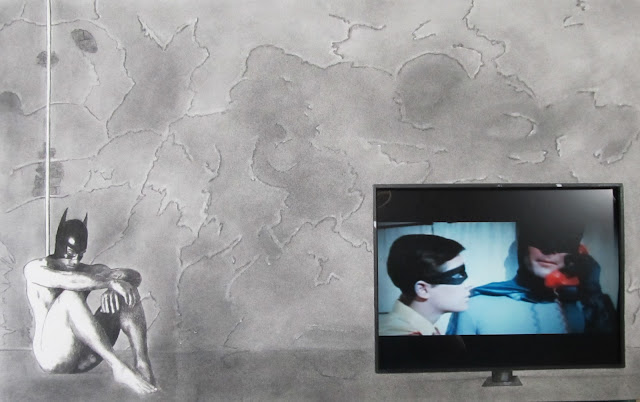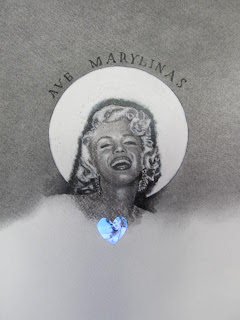The American University Museum at the Katzen Arts Center spotlights the art of its hometown with five of its six new summer exhibitions featuring works by Washington, D.C. artists. Exhibitions open Saturday, June 15, with a reception from 6 to 9 p.m. and close Sunday, August 11.
The museum has a reputation for showing Washington art, something director and curator Jack Rasmussen initiated when the museum opened in 2005.
“Museums were not showing Washington art except on very rare occasions,” Rasmussen said in a recent interview with American magazine. “It’s important to have local artists on your side. They support you, they talk to their friends, the friends come, and all this makes it possible to have a scene in which people want to participate.”
Washington Art Matters: 1940s–1980s tells the story of art made here during five crucial decades. As such, this is the first major effort by a museum to present a comprehensive history, representing those times with works by some 80 artists. The exhibition is based on Washington Art Matters: Art Life in the Capital 1940-1990, a book published by the Washington Artists Museum and co-authored by Jean Lawlor Cohen, Benjamin Forgey, Sidney Lawrence and Elizabeth Tebow.
Tim Tate: Sleep Walker features video installations by Tim Tate, Washington’s best known contemporary glass artist, as well as collaborations with Pete Duvall and Richard Schellengberg. Videos are probably the closest medium we have to experiencing the inexplicable quality of the dream in our waking lives. Rich in symbol, metaphor, movement and mystery, videos—like dreams—enable us to participate in another reality, and, through that participation, to be transformed. Hidden within is the latent content which will give the viewer an understanding of what is happening in the mind of a dreamer.
Raya Bodnarchuk: Form spotlights sculptures by Raya Bodnarchuk, a major artist and influential mentor in Washington for 40 years. Her sculpted animals and people are beautifully and carefully observed, the mature work of a master of many different media. Bodnarchuk trained at the Rhode Island School of Art and Design and the Rinehart School of Sculpture, Maryland Institute College of Art.
Nan Montgomery: Opposite and Alternate consists of recent oil paintings by Washington, D.C., artist Nan Montgomery. Throughout her career, Montgomery’s basic signature has been the use of color as communication, the interest in the painted surface and a minimalist aesthetic. Large fields of color are painted with many color overlays using a small brush.
Kitty Klaidman: Beneath the Surface highlights recent mixed media paintings by Washington, D.C., artist Kitty Klaidman. In these paintings, richly colored acrylic pigment is applied on wood panels covered with molding paste than has been incised with organic patterns. They are then highly glazed. The over-all effect is to make explicit the subtle rhythms and tensions in seemingly static natural settings.
Chester Arnold: Accumulations and Dispersals showcases large-scale, ecologically relevant oil paintings by San Francisco Bay area figurative artist, Chester Arnold. It is the great pageant of life on earth, as seen and remembered by an individual, mixed with dreaming narrative and fictional riff that speaks of the accumulated travails of an individual and an era. The voice and vision, although sparked with critical observation, is orchestrated with an overwhelming love of visual experience. As evidence of an artistic ambition and moral commitment to the human experiment, these paintings celebrate living and art-making and accumulating in a most visible and accessible way.
The museum has a reputation for showing Washington art, something director and curator Jack Rasmussen initiated when the museum opened in 2005.
“Museums were not showing Washington art except on very rare occasions,” Rasmussen said in a recent interview with American magazine. “It’s important to have local artists on your side. They support you, they talk to their friends, the friends come, and all this makes it possible to have a scene in which people want to participate.”
Washington Art Matters: 1940s–1980s tells the story of art made here during five crucial decades. As such, this is the first major effort by a museum to present a comprehensive history, representing those times with works by some 80 artists. The exhibition is based on Washington Art Matters: Art Life in the Capital 1940-1990, a book published by the Washington Artists Museum and co-authored by Jean Lawlor Cohen, Benjamin Forgey, Sidney Lawrence and Elizabeth Tebow.
Tim Tate: Sleep Walker features video installations by Tim Tate, Washington’s best known contemporary glass artist, as well as collaborations with Pete Duvall and Richard Schellengberg. Videos are probably the closest medium we have to experiencing the inexplicable quality of the dream in our waking lives. Rich in symbol, metaphor, movement and mystery, videos—like dreams—enable us to participate in another reality, and, through that participation, to be transformed. Hidden within is the latent content which will give the viewer an understanding of what is happening in the mind of a dreamer.
Raya Bodnarchuk: Form spotlights sculptures by Raya Bodnarchuk, a major artist and influential mentor in Washington for 40 years. Her sculpted animals and people are beautifully and carefully observed, the mature work of a master of many different media. Bodnarchuk trained at the Rhode Island School of Art and Design and the Rinehart School of Sculpture, Maryland Institute College of Art.
Nan Montgomery: Opposite and Alternate consists of recent oil paintings by Washington, D.C., artist Nan Montgomery. Throughout her career, Montgomery’s basic signature has been the use of color as communication, the interest in the painted surface and a minimalist aesthetic. Large fields of color are painted with many color overlays using a small brush.
Kitty Klaidman: Beneath the Surface highlights recent mixed media paintings by Washington, D.C., artist Kitty Klaidman. In these paintings, richly colored acrylic pigment is applied on wood panels covered with molding paste than has been incised with organic patterns. They are then highly glazed. The over-all effect is to make explicit the subtle rhythms and tensions in seemingly static natural settings.
Chester Arnold: Accumulations and Dispersals showcases large-scale, ecologically relevant oil paintings by San Francisco Bay area figurative artist, Chester Arnold. It is the great pageant of life on earth, as seen and remembered by an individual, mixed with dreaming narrative and fictional riff that speaks of the accumulated travails of an individual and an era. The voice and vision, although sparked with critical observation, is orchestrated with an overwhelming love of visual experience. As evidence of an artistic ambition and moral commitment to the human experiment, these paintings celebrate living and art-making and accumulating in a most visible and accessible way.







